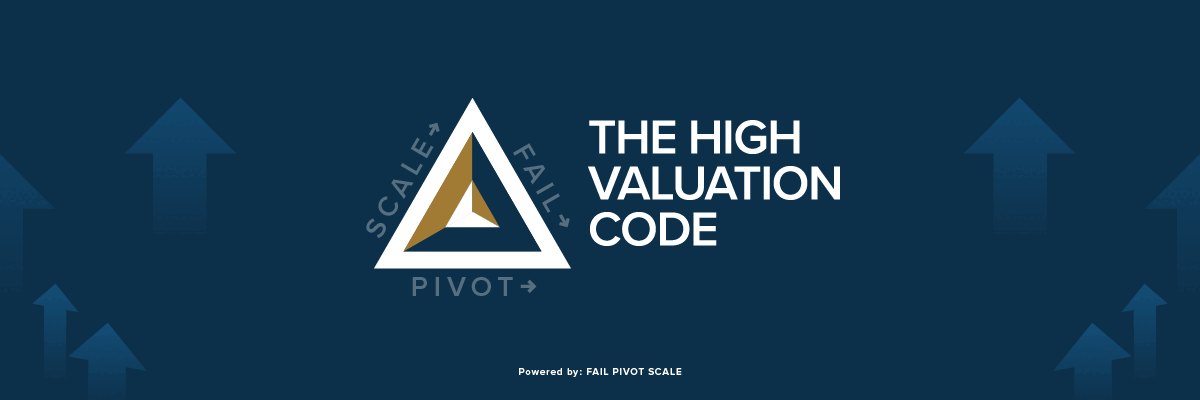- The Exponential Blueprint
- Posts
- The $100M Replication Code
The $100M Replication Code
Why Gillette sells blades the same way Microsoft licenses software


A Note of Gratitude
Before we begin, thank you.
Over 22,000 founders, investors, and executives now read this newsletter every week. You’ve turned The Exponential Blueprint into a movement — not about noise, but about frameworks that create lasting, transferable value.
Now let’s talk about something every founder dreams of — going global — and why, paradoxically, the smartest global strategies often start by looking backward.
FAIL, PIVOT, SCALE.
Every entrepreneur fails. The difference lies in what happens next.
In Fail. Pivot. Scale., CFO and investor Matteo Turi and strategic advisor Simon Bedros reveal how the world’s smartest founders transform setbacks into $100M valuations — not by avoiding failure, but by mastering its hidden blueprint.
Drawing from $480 million in live transactions and nearly three decades in corporate finance and M&A, the authors dismantle the myth that success follows a straight line. Through real-world case studies — from Apple and LEGO to Netflix and Amazon — they expose the two frameworks behind exponential growth:
Fail. Pivot. Scale. — the founder’s journey from breakdown to breakthrough.
The High Valuation Triangle™ — the CFO’s model built on Intellectual Property, Succession Planning, and Global Presence, the three pillars of enduring enterprise value.
Each chapter delivers actionable frameworks, financial intelligence, and leadership playbooks drawn from real boardrooms and battlefields of business. You’ll learn how to turn financial pressure into investor magnetism, rebuild your brand narrative, and structure your company for lasting wealth.
This isn’t theory. It’s a survival manual for founders ready to evolve from invisible to investable.
If you’ve failed before — good. You’re halfway there. Your rebuild starts here.

The High Valuation Code is now live and you can follow the “Fail, Pivot, Scale” journey live.
The Illusion of “Going Global”
When founders picture international growth, they imagine flags on new maps, more customers, bigger markets.
But expansion is not the same as multiplication.
Many founders rush into new countries, hire distributors, sign leases, or open offices — and within a year, they’re drowning. Logistics, taxes, culture, and cashflow eat the dream alive.
The truth? Going global without precision is the fastest way to lose control — and valuation.

The Tesla Lesson — $600B From Sequenced Expansion
Tesla could have launched everywhere at once. Instead, it expanded with discipline:
Start small with luxury U.S. buyers.
Enter Europe, where eco-policy created early adopters.
Scale in China, the world’s largest EV market.
Tesla’s value didn’t come from speed — it came from sequencing.
But here’s the deeper insight: Tesla’s global strength also came from IP leverage — its proprietary battery design, software, and Supercharger network. Each market expansion wasn’t new work; it was replication of protected IP.
That’s the real global multiplier.
Look Back to Move Forward
Here’s the paradox every founder must understand:
Before you look for new markets, look back at your IP.
What you’ve already built might be more powerful — and more scalable — than anything new.
True globalisation starts with replication, not reinvention.
The Gillette–Microsoft Parallel
You’d never think a razor company and a software giant have something in common. But they do.
Gillette sells razors and blades. The blades are consumable IP — the recurring engine.
Microsoft sells software and licences. The licence is the recurring engine.
Different products. Same model.
Each sale creates a customer locked into a repeating cycle of value.
This is what I call the replication model — turning one innovation into endless monetisation loops.

The Franchising Model — IP as a Passport
McDonald’s didn’t conquer the world by cooking more burgers. They went global by franchising their IP:
Operating systems
Training manuals
Branding and processes
Every restaurant paid to replicate a proven model — not to invent a new one.
That’s why McDonald’s became a $200B global empire while still feeling local in every country.
Franchising isn’t limited to food. It’s the ultimate IP monetisation model. Whether you run a creative agency, a SaaS business, or a consultancy, you can design replicable systems others pay to use.
The Distribution Play — IP Scales Faster Than People
Another overlooked lever: distribution partnerships.
When you licence your IP to others who already have infrastructure, you expand globally without owning the overhead.
Think Netflix licensing content to regional networks before launching its own platform, or small manufacturers partnering with local distributors instead of opening foreign offices.
This is precision expansion — growing through leverage, not labour.
The Easiest Money You Will Make All Year
Some mistakes drain your momentum. Others repair it.
Overpaying for insurance? That’s the first kind.
Switching smartly? That’s the second.
I’ve partnered with Quotezone so you can compare car, van, and home insurance in just minutes — simple, quick, and jargon-free.
Many readers save hundreds of pounds every year.
One smart switch = more cash for what matters most.
The Small Founder Case — From Burnout to Replication
Let me share a real-world example.
A founder I coached, let’s call her Emma, ran a successful wellness brand in London. Her products were loved locally, and international enquiries started coming in. She thought global expansion meant building warehouses abroad and hiring teams.
Within 18 months, she was exhausted and cash-strained.
When we reviewed her IP, we realised she could franchise her retail concept and licence her brand formula to partners instead.
She went from managing 5 foreign branches to overseeing 12 franchisees.
Her profit tripled — and her burnout vanished.
Because she looked back before scaling forward.
Why Founders Get This Wrong
Ego. We think expansion means “doing it all ourselves.”
Misunderstanding IP. We forget that our processes, products, and data are assets others can buy.
Investor pressure. Growth targets force expansion instead of precision.
But investors value businesses that scale through systems, not through stress.
If your model can be licensed, franchised, or distributed — your valuation will soar.
The Third Side of the High Valuation Triangle
Let’s recap the full framework:
1️⃣ Monetise IP — Turn what you own into compounding value.
2️⃣ Build Succession — Create leadership depth so the business survives you.
3️⃣ Expand with Precision — Scale globally by replicating IP, not yourself.
When these three sides align, valuation compounds exponentially.
Practical Steps for You
Before you chase new markets, ask:
What part of my business could someone else run — if I licensed it?
Do I have a process, brand, or technology that could be replicated?
Can I test expansion through partners before opening offices?
The goal isn’t speed. It’s repeatability.
That’s what investors value.

Where The High Valuation Code Comes In
Inside The High Valuation Code, I break down how companies like Tesla, Gillette, and McDonald’s expand using IP leverage.
You’ll learn:
The 1,040-point investor checklist for valuation readiness.
How to design franchise-style scalability even in service businesses.
Frameworks for licensing, royalties, and distribution deals that grow value without extra effort.
And as always, enrollment is limited to 25 new founders each month, closing on the 7th.
🚨 Limited Access: The High Valuation Code
✅ Weekly founder-only premium editions
✅ 1,040 investor scoring points decoded
✅ The Fail · Pivot · Scale toolkit
✅ A private founder community + live Q&As
⚠️ Only 25 new founders per month. Doors close on the 7th.
Final Thought
Going global isn’t about geography — it’s about geometry.
The companies that scale sustainably expand outward only after perfecting what’s inside.
They replicate, not reinvent.
They leverage, not labour.
Gillette doesn’t sell blades — it sells a recurring idea.
Microsoft doesn’t sell code — it sells permission to use it.
And small founders who think globally through IP replication are the ones who achieve valuation freedom.
Because sometimes, the smartest way forward is to look back.
PS: Expansion should multiply freedom, not pressure. If your growth feels heavier instead of lighter, it’s time to change how you scale. The High Valuation Code shows you how to expand through IP, partnerships, and licensing — not burnout. Only 25 seats open each month, closing on the 7th.
To Your Exponential Success,
Matteo Turi
Matteo Turi is a UK-based Chartered Accountant (ACCA), CFO, and author of the upcoming book Fail. Pivot. Scale. He is the creator of the High Valuation Triangle™, a system that helps businesses engineer valuation growth through intellectual property, leadership depth, and global scalability. Matteo also writes The Exponential Blueprint, a finance and entrepreneurship newsletter read by 22,000+ founders and investors. Visit www.matteoturi.com or connect on LinkedIn for insights on scaling with resilience and purpose.

Reply